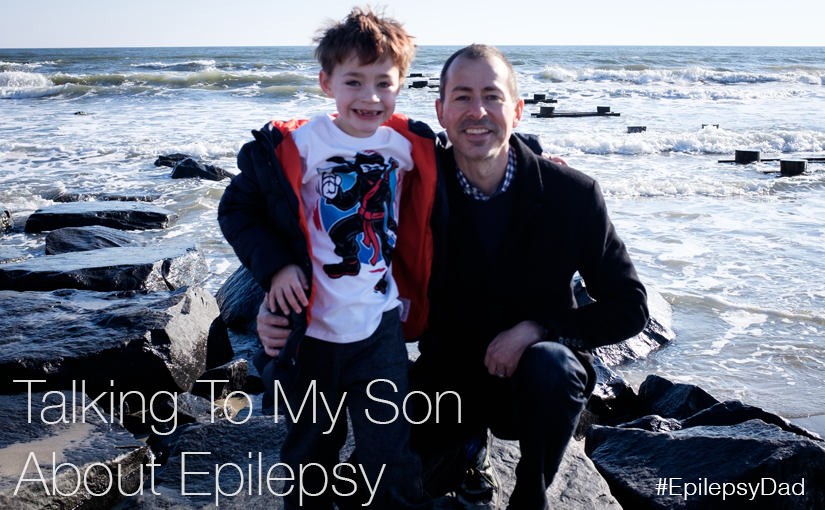Imagine we are sitting at a table across from each other. I’m trying to teach you a complicated concept. Except I don’t understand the concept, either. And I’m also trying to teach it to you in another language. Except neither of us speaks that language. And the room we are in is pitch black.
That is what it is like to talk to my son about epilepsy. It’s a topic that I didn’t have a reference for until it entered our lives. I’m learning what it means to be the parent of a child with a disability, but not what it means to have epilepsy. My son has a different perspective. He knows what it feels like to have epilepsy, but he doesn’t have the words to always share what he is going through. He doesn’t remember his life before seizures enough to describe the difference. So we fumble as we try to connect and create a shared experience.
Occasionally, I’ll be able to pull something out of my growing knowledge bank to share with him. A few weeks ago, we strolled through Caesar’s Casino in Atlantic City. We passed a statue of Julius Caesar and I mentioned that he ruled the Roman Republic. I also mentioned that he had epilepsy. “He had epilepsy and he ruled the world, ” I said, “so you can do anything that you want to do.” I skipped the part about Julius possibly suffering from migraines and not seizures. The opportunity for bonding was more important than proven historical accuracy.
There are flashes of a connection, but not enough of one. Epilepsy and seizures will affect him for the rest of his life. History lessons might be inspirational, but they don’t explain what he is feeling and why. They won’t build his epilepsy vocabulary. They might keep him hopeful, but they can’t predict what it will be like for him in the future. Nothing can.
As a father, it makes me feel helpless. It’s my job to protect him. It’s my job to teach him the ways of the world. I think that if I do more research, if I learn more facts, that I’ll somehow be able to forge a path for him. If I can’t make him better, I at least want to make his life easier. But without knowing what he is going through, I’m never sure I’m doing the right thing. What I can do, and what helps me balance my frustration, is loving him and making him feel secure.
Sometimes, there is light in the room. I’m able to see how brave he has become when he tries something new, talks to people, or jumps fifteen feet into a ball pit. I see how hard he works to do basic tasks and how much harder he has to work to do the things he likes doing. There is enough light to see that our family is around the table, trying to connect with each other. We’re still not speaking the same language, but there is enough light to see that we’re in this together.

Beautiful stuff – have the same issue with my son with high functioning ASD.
In the end I boil my mission down to two parts
1) Generate wonderful memories for him of his childhood
2) Do everything we can now to prepare him for the world – give him coping skills, help him know that failure is only “failure” if you don’t learn from it – so learn.
Most people “succeed” in life not out of sheer skill but out of sheer persistence and doggedness.
And frankly protection doesn’t come into it. We can’t do everything we want but we can accept where we are but take one step forward at a time. Learn to try, (and to fail) and to iterate (learn about Stoicism – it really helps!)
Every failure is an opportunity to learn.
As Walt Disney said “Just keep moving forward”
Great thoughts, Frank, thanks for sharing. That’s exactly the right mission IMO and I’m trying to do the same. ~Dave
Does anyone have a article on how a parent who has epilepsy themselves describes epilepsy to their child? Ive not seen one yet.
Hi, Stephanie. I haven’t but I’ll tweet something out and see if anyone can recommend one. ~Dave
Hi, Stephanie. This link was passed along. Hope it is helpful: http://lancefogan.blogspot.com/2017/02/blog-79-telling-your-children-you-have.html
Yo soy epiléptico, talvez lo que menos importa es saber que nos depara el futuro, sino convencerce que nuestras vidas son un milagro, que si sacrifica poco lograra mucho y que esa habitación sin luz es la salida a un sinnúmero de ventanas donde hasta la ignorancia entrará a decidir, admiro que compartas tu experiencia talvez sea más fácil en un futuro solo expresar que la epilepsia nos escogió pero que nosotros no a ella…Por lo que nuestra vida y sus metas no tienen que cambiar!! Best regards!!
Gracias, Óscar!
Google translation:
I am epileptic, perhaps the least important is to know that the future holds us, but convince that our lives are a miracle, that if it sacrifices little achieved much and that room without light is the exit to a number of windows where even ignorance It will come to decide, I admire that you share your experience may be easier in the future only to express that epilepsy chose us but that we do not to her … So our life and goals do not have to change !!
It’s 6 am and I’m enjoying reading your blog, subscribing! 🙂 (I don’t see a place on your blog to subscribe)
Thanks, Alex! I added the subscription form to the side bar now so it should be more apparent. Thanks for reading! ~Dave